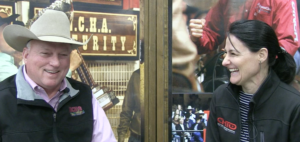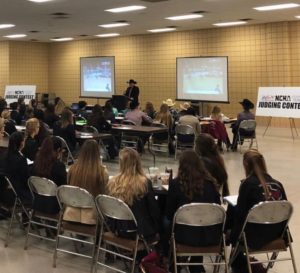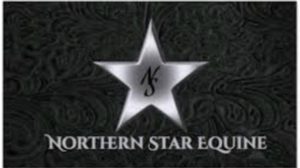 Being judged is always emotional, even when you choose to be judged in the name of competition. Subjective sports are often rife with controversy, because let’s face it, everyone has an opinion. Cutting is no exception.
Being judged is always emotional, even when you choose to be judged in the name of competition. Subjective sports are often rife with controversy, because let’s face it, everyone has an opinion. Cutting is no exception.
Judging only works when there is a clearly understood system governed by rules, enacted by experts, and most importantly, is delivered consistently. You could say, this has been the overriding mission of Russell McCord for more than 30 years!
The longest serving Director of Judges at the National Cutting Horse Association, McCord is now stepping down after 18 years at the association not forgetting another 16 years as a judge and monitor (organizing the judges at shows) prior to that.
“It’s just been such a long journey. It’s coming to the end quick. So there’s a lot of emotions, you know, happy and sad,” said McCord.
McCord has overseen tremendous change in the industry, from the quality of horses, to training styles to the increasing importance of technology.
But whatever challenges were thrown his way, McCord’s goal always stayed the same. “All I ever wanted when I took this job was to try to make the competition as fair as I possibly could for the competitors, that’s all I ever wanted out of it. And I thought if I stay here 10 years, I have really done good. I never in my wildest dreams thought I would stay this long and that’s still my goal today. I just fret and worry over trying to make the competition as fair as we can possibly make it,” McCord said.
McCord knows what it is like to be a cutting horse competitor. He grew up on a horse ranch at Leonard, TX where he developed a passion for cutting as a teen thanks to a neighbor involved in May 31 – Jun 2: NCHA Convention – Fort Worth, TX Jun 9: Belmont Stakes – Elmont, NY- Who are you betting on? June 16: Father’s Day Jun 22- 29: Western Nationals – Denver, CO the sport. McCord joined the NCHA fresh out of high school and started showing, overflowing with enthusiasm.
“It’s so funny, I get my first Chatta and I got my first cutting horse and…so I picked out a show to go to a weekend show and it said horse entries close at eight o’clock and I’m in the “never won anything class” at the tail end. Well, I make sure I’m there plenty early, about 7 o’clock to get this horse in it and I ride to the herd at 5 a.m. the next morning. So I got a really strong message that at the first cutting,” he laughed.
After a few years as a non pro, McCord started training for the public but a faltering economy soon thwarted those plans. 
“I was riding a lot of horses and then all of a sudden we woke up one morning and everybody started pulling horses out of the barn, everything got really scary and I looked at it another way to get diversified and make income. So I took a judging test in 1985 and done fairly well on it and had won a little bit prior to that in the open classes so they started hiring me immediately to judge larger shows. Within a year, a year and a half, I’m judging five-judge monitored events and just a short time later, I’m judging the Futurity. So it just kind of took off.”
It took off because McCord had a talent for judging and a drive to develop it.
“Just everything I’ve done in my life, I always just study it. I just live and breathe it. It’s whether I’m judging or trying to monitor or playing golf or training dogs. Whatever it is, I just go in a hundred percent and study and study and study. I’m just 24/7, I can’t quit working on it,” he said.
When McCord started working at the NCHA first as Assistant Director of Judges in 2001, then 3 years later as Director, he said his main priority was to hold the judges accountable.
“The vision I had was, when you have a judging system that the competitors hold the judges accountable, you have a broken system. And when you have some S.O.B. at the top that’s strong enough and tough enough to hold the judges accountable, you have a fair judging system because the only way they’re going to get rehired or told they did a good job is if they get this cutting close to right,” he said.
Besides being tough on judges, McCord said he and his team had to rethink how judges critiqued the runs so that competitors could understand and could be consistently applied across the board. “Early on you know, we had a tremendous amount of complaints. And so what we did was figure out a system. They had an old thermometer theory and we figured out a new thermometer theory that you could reason with someone.” he said.
In a move that transformed the sport, McCord and his team decided to stop being too heavily focused on when things go wrong and award more points when things go right. That seemingly simple adjustment made scores higher and crowds more excited! “We learned early on that people want to enjoy the sport and they enjoy reward being rewarded high scores and they go away, and our sport suffers when judging becomes real negative. So we figured out a way to get our scores up higher than they’ve ever been,” McCord said.
“Instead of taking those penalties off at the end, we’d learned early on take them off after each cow and they weren’t quite as severe in the scoring and the scoring was going to be higher,” he added.
It was a winning combination of math and psychology.
“You won’t hear that crowd roar on 213, but at 220 let it jump up there and everybody gets excited.”
The challenge then was to sell the new scoring system to the industry. McCord said the to the industry. McCord said the key was explaining it to the professional trainers.
“If you can get your professional trainers to understand your scoring system and how you’re evaluating it, they can live with it. They might not always agree with us. But if they can explain it to their customers then, everybody’s good to go,” he said.
With score cards breaking the runs down cow by cow, McCord said they are a great learning and training tool. They also help cool some hot heads he said with humor.
“When we have a member come to us and they’re frustrated because they didn’t score what they felt like they should. The first thing we tell them is “Hey, we can’t review it with you today, we got a 24-hour cooling down period.” “We’ll be glad to go over it with you tomorrow, but you need to go watch it on video and you need to go look at your score cards,” and I would say at least 50% of the time, they never come…It makes sense to them. They discover, they cool down and they go away. The other 50% I’ve had to deal with so, yeah.”
Despite handling judges and the judging system, much of McCord’s time is spent managing members. He said he was grateful to his father, who put him to work as a young man in his window factory handling the complaints department which helped him as the Director of Judges.
“Just stay calm, listen, deal with the facts, don’t get emotional about it, you know, don’t take it personal, they’re just venting and that really helped me early on figure out how to how to deal with people and hopefully I’ve done a fair job at it,” he said.
After judging thousands of runs, monitoring hundreds of shows and delivering countless seminars, McCord has a unique insight into cutters and what it takes to be successful in the sport. He’s studied and critiqued the best in the industry.

Russel teaching Youth Judging Contestants
“The thing that drives a champion is not the winning, it’s the losing. They love to win, they want to and that’s what they work for.” “But every time they go somewhere and they get beat, it just eats on them and they go home and they work and they work and they work till they get their horses right and get their self right and then they come back and they’re a champion again,” McCord said.
McCord plans to capitalize on his finely-tuned skill set and years of judging experience by offering one-on-one showmanship coaching to cutters. It’s an under-utilized service in cutting where most of the focus is on getting the horse trained, rather than the rider.
His biggest tip he said is to focus own how you get the cow cut and to make the judge want to be sitting in your saddle. McCord said you want that judge to be thinking: “This is exactly where I’d want to be on that cow. And this is going to feel awesome. That’s one whose scores keep going up, up, up,” he said.
Besides coaching and giving clinics from a judge’s perspective, McCord is excited to return to training Border Collies for national sheep dog trials.
Looking back, McCord said he’s proud to have been a part of giving away $640-Million in prize money in the last 18 years. He finishes in the job on June 7.
Brought to you by:

